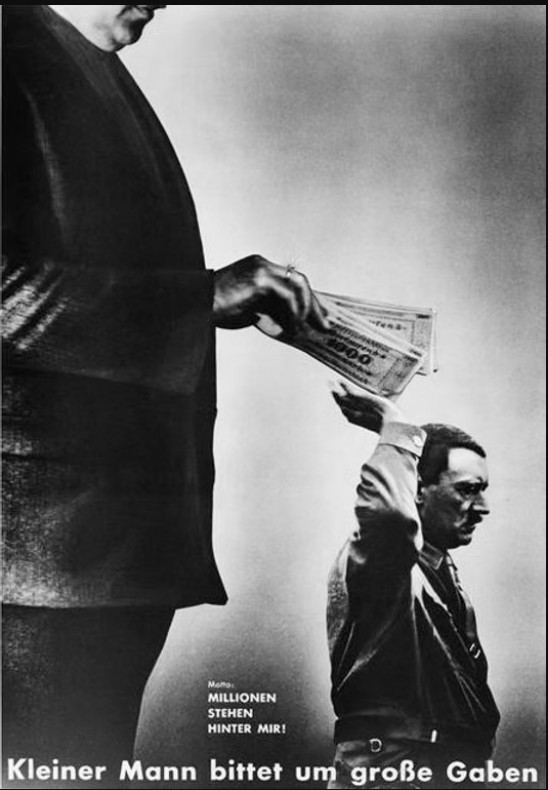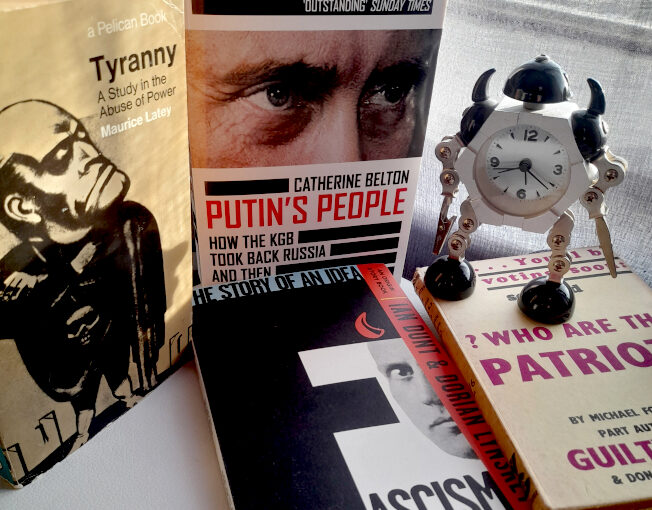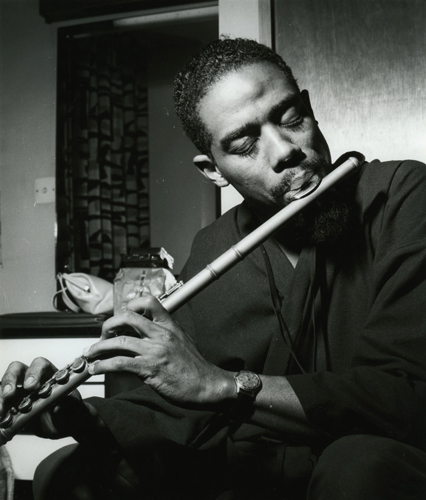I had already started writing this, but about half an hour ago the point I want to make was violently reinforced for me. I was waiting at the counter in a café, a radio was on in the background. A senior political figure was being interviewed – not a member of the current government but an elderly-sounding member of the House of Lords who was a veteran of the diplomatic service, I didn’t catch his name. Before I demonise him too much, I should point out that, even if he did represent the British government, he would have no real power over the situations he was invited on the air to discuss. In a way, that actually makes it worse, because it means he is in a position where he can openly speak his mind and presumably, this was his mind.

He was asked about two situations that are more similar than is often portrayed in the media, though one is significantly bloodier. That is, two invasions which are really attempted annexations or land-grabs by political leaders with ideological agendas. In the political discourse on the left you hear a lot about how differently the invasions of Ukraine and Palestine are being treated by the political and media establishments (and to a degree the British public), but although there is truth in that, to be fair to the interviewee, he barely differentiated between the two.
When asked about the latest meeting between the Presidents of the United States of America and Russia to discuss the fate of Ukraine – just writing that highlights the essential absurdity of it – the interviewee was reasonable, measured, but oddly wry. While he was clearly concerned about Ukraine and the plight of the Ukrainian people, the general tenor of his response was a kind of verbal shrug. The dryly amused ‘what-can-you-do-with-these-guys?’ tone characterises the way that many of the more serious figures in the British political and media spheres engage with the current administration of the USA and, to a lesser extent (because there’s no need to pretend that he’s an ally) with the government of Vladimir Putin. Moving on to Israel/Palestine/Gaza there was, similarly, some concern about the people currently being attacked, plus the expected bit of ‘what about Hamas?’ waffle, which I don’t think was disingenuous in this case, as it so often is. Because from the point of view of a career diplomat, there is a question about what happens with Hamas after the slaughter stops. It’s a problem that’s been made a much worse and much more unavoidable by Benjamin Netanyahu’s much-publicised funding of Hamas which essentially neutralised any chance of a moderate Palestinian government – but regardless of how they got there, it’s not a situation that will suddenly be resolved, whichever way (to put it coldly) the invasion of Gaza works out.
But when asked about Netanyahu himself – and it’s worth remembering what his reputation and status were before October 7th 2023 – and the current Israeli policy, that shrug returned; ‘what-can-you-do-with-these-guys?’ Well, it’s doubtful that a British diplomat, or even a member of the British government can do much to influence someone like Netanyahu – at least not while he has the backing of the US government – but one thing they can do and should do with any rogue politician from any country is to stop acting as if behaving in a consistent, predictable, true-to-character way is the same thing as behaving in an acceptable way. Given that the UN does have rules, guidelines and standards of conduct, acting as though the leaders of some of its nations are unfathomable forces of nature rather than political figures who make conscious policy choices is not helpful, either to the world or to the UN itself, which is only as effective as world leaders make it.

It would of course be nice if our political/media figures were bluntly critical of despots and would-be authoritarians – but if not, they could at least stop being indulgent towards them or nice about them. There are people who think that diplomacy is, by its nature damaging and wrong, but though it certainly can be, I believe in it, when used appropriately. It’s hard not to believe in it, if like me you grew up during the final phases of the Cold War. That decades of aggressive brinkmanship and paranoia should have ended peacefully with virtually no bloodshed (at least between the major players in the cold war) was a barely-credible relief at the time and, given the mental state and emotional temperature of world leaders in the 21st century, it now seems almost miraculous. That resolution really is a testament to the leaders, and particularly Mikhail Gorbachev, whose sober unflappability wasn’t shared by many politicians then, and doesn’t even seem to be a desired trait among the political class now. There are many times and many situations where sober, reflective diplomacy are desirable.
Conversely, when faced with the actions of hysterical, erratic, devious and capricious idiots or their cynical, opportunistic enablers and hangers-on, or coolly calculating monomaniacs, the kind of reasonable, statesmanlike professional on the radio this morning is at an immediate disadvantage. Acting according to the norms of your profession with people who have no respect for those norms is pointless at best. Even then, that doesn’t negate the whole profession of diplomacy; when meeting with powerful, impetuous morons, being calm and professional is a given and, for many reasons it’s the right thing to do. But to go further than that – to act like the terrified child who wants to appease the bully, or the substitute teacher who wants the scary kids to think they are cool – is a mistake that politicians, unless they happen to be in the final twilight of their careers, will live to regret.

Wherever there are tyrants, authoritarians and powerful reactionaries, there is never any shortage of people willing – even against their own interests – to defend and promote them. But we are currently at a strange point in history where these people are so brazen and shamelessly open about their own actions that media commentators and politicians – occasionally with no special vested interest (but often with a financial one) – who do see the shame in those actions are willing to make claims on the behalf of their idols which go beyond any statement made by the perpetrators themselves. I would expect this to be a right-wing problem, because I’m a prejudiced left-winger, but it seems to be more of an ideological problem than one that is specific to either end of the spectrum.
And so, even though on the eve of the invasion of Ukraine, Vladimir Putin himself gave a long speech on Russian TV, where he ranted at length about historical grievances, denied Ukraine’s right to exist at all and talked about restoring the old Russian Empire, never once mentioning NATO, British commentators on both the left and right have repeatedly attempted to justify Putin’s actions with reference to the perceived threat to Russia’s borders posed by NATO expansionism and so forth. It doesn’t seem that Putin has asked them to legitimise his actions – he doesn’t seem to think his actions need justifying at all, beyond the simple fact that he thinks Russia should own Ukraine – so why embarrass yourself by making claims on his behalf?
Similarly, members of the Israeli government have been blunt about their desire to remove the Palestinian people from Gaza one way or another. Those of us with memories going back a few months may even remember discussion, involving the US government, about turning the area into a resort. There are photos online of members of the IDF standing in ruins holding the banners of real estate companies, there are videos shared by IDF fighters where they laugh as they rake through the underwear drawers of Palestinian women in their deserted houses, where they joke about using children for target practice. As the Israeli historian Ilan Pappé has discussed, it’s not like these kinds of debates on what to do with Palestine are new or unusual. So why would any western politician or media spokesperson feel the need to frame the situation as a war between two equal states, or talk endlessly about the hostages that the Israeli government seems not to care about?
In lieu of holding Netanyahu’s administration to the standards expected of every other member of the UN, we are instead constantly asked what about Hamas? Well, no doubt they have their own gloating social media presence, glorifying their inhuman acts, but they aren’t an everyday part of normal, Western social media and however much the Israeli government likes to frame all criticism of themselves as antisemitic Hamas propaganda, I haven’t so far seen a single mainstream politician online or on TV criticise Israeli policy without also condemning Hamas and calling for the freeing of those Israeli hostages. That those hostages are important and should be prioritised should go without saying, just as the fact that almost everyone living in a Western democracy is fundamentally opposed to a repressive theocratic organisation like Hamas should go without saying; and yet it has to be stated again and again because of the way the events – in reality it can barely be categorised as a conflict, let alone a war – are being presented.
So, yes, there is definitely a time for diplomacy – it’s both necessary and desirable when negotiating the different cultures, belief systems, nationalities and identities that make up the modern world. And while it would be nice – a relief even – to hear a senior British politician not just commenting on or blandly ‘condemning’ the words or actions of any rogue regime, whether our supposed allies or not, nor just or urging them to change their ways – but launching a scathing tirade against them, taking legal action in international courts and cutting all unnecessary ties with them, nobody can realistically expect that, It’s just not how politics work. But, as our successive governments have managed to coexist for decades alongside ideologically opposed countries like China or North Korea without the constant threat of war and without feeling the need to openly pander to and flatter their leaders, then it shouldn’t be too much to ask that they do the same with governments whose values are not supposed to be so far removed from our own.
Speaking as a citizen of the UK, if the core values of our country really are what we say they are – democracy, tolerance, compassion and all that – then at some point, coming up against the opposite, diplomacy should only go so far.
————————————————————————–
Postscript: on the day I started writing the final version of this, I heard that radio interview. This morning, as I finished it I saw three news stories that all made this mild call for bluntness seem worse than ineffectual: in one, the Israeli government had targeted and wiped out an entire Al Jazeera news crew. Typically, the UK news talks about ‘collateral damage,’ but IDF spokespeople have talked proudly about removing “Hamas terrorist” Anas al-Sharif, who neither they nor anybody else believes was a Hamas terrorist, because he demonstrably wasn’t.
In the USA, the President, while deflecting questions (again) about the files relating to a dead paedophile that was once a friend of his, is talking openly about forcibly removing city administrations to ‘re-establish law and order’ in areas which seemed to have had no special law and order issues until he created or declared them.
Finally, I was watching footage of an old blind man, a woman in her eighties and an elderly military veteran being arrested by the police for holding placards at a peaceful protest while, elsewhere in the UK the police impassively watched a mob of people screaming racist abuse at a hotel where refugees from war zones are being housed, and stood casually by as the leader of an admittedly moribund political party danced around and made Nazi salutes. There is no single correct response to these events, but empty diplomacy from the country’s leaders has nothing to offer in any of them.




 A foolish name, you might think; and yet there have been no less than three different bands called Funeral Bitch. This is the first and best of the three, the one formed by Paul Speckmann in 1986-8 between different incarnations of the much better known Master. Funeral Bitch were much in the same vein; extremely fast and rough (though still anthemic) death/thrash, with Speckmann’s hoarse bellowing a bit too prominent in the thin mix. That said, the demos are imbued with a real raw vitality that could arguably have been lost with the kind of production favoured by the big-name thrash bands of the era. It’s a real time capsule of the more extreme end of the 80s thrash scene and there’s a fair amount of intentional silliness too; a key but often forgotten feature of era. Interestingly, the guitarist is Alex Olvera, better known for his tenure as bassist with mid-level speed metal band Znöwhite around the same time. Only essential for Master fans, but generally fun, even if the live tracks are (appropriately) ‘rough as guts’ as they say down under.
A foolish name, you might think; and yet there have been no less than three different bands called Funeral Bitch. This is the first and best of the three, the one formed by Paul Speckmann in 1986-8 between different incarnations of the much better known Master. Funeral Bitch were much in the same vein; extremely fast and rough (though still anthemic) death/thrash, with Speckmann’s hoarse bellowing a bit too prominent in the thin mix. That said, the demos are imbued with a real raw vitality that could arguably have been lost with the kind of production favoured by the big-name thrash bands of the era. It’s a real time capsule of the more extreme end of the 80s thrash scene and there’s a fair amount of intentional silliness too; a key but often forgotten feature of era. Interestingly, the guitarist is Alex Olvera, better known for his tenure as bassist with mid-level speed metal band Znöwhite around the same time. Only essential for Master fans, but generally fun, even if the live tracks are (appropriately) ‘rough as guts’ as they say down under. Kariti is a Russian-Italian singer of dark folk music and, after an extremely peculiar and archaic-sounding voices-only intro, Covered Mirrors becomes an album of moody semi-acoustic songs which are not especially folk-sounding, but are very pretty indeed. The guitar sound is crisp and almost tangible, and the vocals (mainly in English) are clear and mournful, as befits the album’s themes of ‘death and parting’. It’s a beautifully grave and austere record, with an intimate quality that (especially through headphones) brings the listener extremely close to the performance, while remaining emotionally remote and unreachable: a perfect album for a time of quarantine, if not one that will cheer anyone up.
Kariti is a Russian-Italian singer of dark folk music and, after an extremely peculiar and archaic-sounding voices-only intro, Covered Mirrors becomes an album of moody semi-acoustic songs which are not especially folk-sounding, but are very pretty indeed. The guitar sound is crisp and almost tangible, and the vocals (mainly in English) are clear and mournful, as befits the album’s themes of ‘death and parting’. It’s a beautifully grave and austere record, with an intimate quality that (especially through headphones) brings the listener extremely close to the performance, while remaining emotionally remote and unreachable: a perfect album for a time of quarantine, if not one that will cheer anyone up. Alternately really great and very silly indeed, the sci-fi theme/concept behind Space Goretex sometimes gets in the way of the music. At its best the marriage of the unusual (but mostly surprisingly low key) musical textures of
Alternately really great and very silly indeed, the sci-fi theme/concept behind Space Goretex sometimes gets in the way of the music. At its best the marriage of the unusual (but mostly surprisingly low key) musical textures of  Always a surprise to find that non-mainstream musicians still release singles, but that’s what Manes are doing; and, like their last album, the superb Slow Motion Death Sequence it’s black metal in feeling only; musically the title track is a kind of eccentric and brooding widescreen gothic rock (I guess; it reminded me a bit of the Planet Caravan type early Black Sabbath ballads and musically but definitely not vocally a little bit of Fields of the Nephilim; there’s no electronic element on this one). It’s beautifully recorded, the title track warm and limpid but with an undertone of unease that builds throughout. The B side (is that still what it is for a digital release?) is Mouth of the Volcano, an atmospheric doomy semi-electronic chug built around a strangely familiar spoken word section that can’t place and featuring Asgeir Hatlan (last heard in Manes on 2014’s Be All, End All) and some spooky Diamanda Galas-ish vocals from Anna Murphy (ex-Eluveitie) and Ana Carolina Skaret. An unsettling but very listenable pair of songs and so a single worth releasing; and with beautiful artwork too.
Always a surprise to find that non-mainstream musicians still release singles, but that’s what Manes are doing; and, like their last album, the superb Slow Motion Death Sequence it’s black metal in feeling only; musically the title track is a kind of eccentric and brooding widescreen gothic rock (I guess; it reminded me a bit of the Planet Caravan type early Black Sabbath ballads and musically but definitely not vocally a little bit of Fields of the Nephilim; there’s no electronic element on this one). It’s beautifully recorded, the title track warm and limpid but with an undertone of unease that builds throughout. The B side (is that still what it is for a digital release?) is Mouth of the Volcano, an atmospheric doomy semi-electronic chug built around a strangely familiar spoken word section that can’t place and featuring Asgeir Hatlan (last heard in Manes on 2014’s Be All, End All) and some spooky Diamanda Galas-ish vocals from Anna Murphy (ex-Eluveitie) and Ana Carolina Skaret. An unsettling but very listenable pair of songs and so a single worth releasing; and with beautiful artwork too. More solemn, downbeat but mostly very pretty music. I had never heard Midwife (the solo project of Madeline Johnston) before; on this album at least, it’s a bare, guitar-based sound with some ambient electronic elements, sort of shoegaze-y but not. The nearest comparison I can think of (not that anyone asked for one) is Codeine circa Frigid Stars. Forever was inspired by the unexpected loss of a friend and the music is as fragile and mournful as you’d expect. The sound is warm, clear and intimate-sounding – aside from the vocals, which are distanced by a strange spacey, reverb effect; perhaps for the best as the raw emotion is rendered slightly remote and universal, rather than immediate and personal. It’s clearly not an album for all moods: although the closing track S.W.I.M. speeds up to a Jesus and Mary Chain-esque plod, Forever is consistently slow and elegiac and nothing really lifts it out of its furrow of sadness: but beautiful for all that.
More solemn, downbeat but mostly very pretty music. I had never heard Midwife (the solo project of Madeline Johnston) before; on this album at least, it’s a bare, guitar-based sound with some ambient electronic elements, sort of shoegaze-y but not. The nearest comparison I can think of (not that anyone asked for one) is Codeine circa Frigid Stars. Forever was inspired by the unexpected loss of a friend and the music is as fragile and mournful as you’d expect. The sound is warm, clear and intimate-sounding – aside from the vocals, which are distanced by a strange spacey, reverb effect; perhaps for the best as the raw emotion is rendered slightly remote and universal, rather than immediate and personal. It’s clearly not an album for all moods: although the closing track S.W.I.M. speeds up to a Jesus and Mary Chain-esque plod, Forever is consistently slow and elegiac and nothing really lifts it out of its furrow of sadness: but beautiful for all that. More black metal, this time from Iceland. Pretty standard (in a good way), polished but not symphonic black metal, modern but very much influenced by the classic Scandinavian bands (maybe more the second-and-a-half wave, like Kampfar than the classic Mayhem-Darkthrone-Burzum axis) it’s all very well put together and has plenty of muscle and melody. Two things save it from just being yet more (and there is a lot of it) proficient ‘grim & frostbitten’ black metal – firstly, some strange and very Icelandic anthemic moments; I say very Icelandic only because those moments remind me a bit of some of the epic, windswept bits in Solstafir’s music. Although recommended by the label for fans of fellow Icelanders Misþyrming, Nyrst, though inhabiting more or less the same kind of sub-genre, definitely have their own sound and style. (I highly recommend Misþyrming’s
More black metal, this time from Iceland. Pretty standard (in a good way), polished but not symphonic black metal, modern but very much influenced by the classic Scandinavian bands (maybe more the second-and-a-half wave, like Kampfar than the classic Mayhem-Darkthrone-Burzum axis) it’s all very well put together and has plenty of muscle and melody. Two things save it from just being yet more (and there is a lot of it) proficient ‘grim & frostbitten’ black metal – firstly, some strange and very Icelandic anthemic moments; I say very Icelandic only because those moments remind me a bit of some of the epic, windswept bits in Solstafir’s music. Although recommended by the label for fans of fellow Icelanders Misþyrming, Nyrst, though inhabiting more or less the same kind of sub-genre, definitely have their own sound and style. (I highly recommend Misþyrming’s  And another one-woman folk project. Ols (Polish singer and multi-instrumentalist Anna Maria Oskierko) is very different from Kariti though, and Widma is a primitive, ritualistic sounding album with none of Covered Mirrors‘s accessible, almost pop sheen. Widma does sound traditional, but it’s more akin to Wardruna and the archaeological end of pagan folk music than the glossy Clannad-ish kind recently heard on the latest Myrkur album. This is, by contrast, pleasantly droning and primal (and in that respect reminds me of an album I bought via MySpace many years ago by
And another one-woman folk project. Ols (Polish singer and multi-instrumentalist Anna Maria Oskierko) is very different from Kariti though, and Widma is a primitive, ritualistic sounding album with none of Covered Mirrors‘s accessible, almost pop sheen. Widma does sound traditional, but it’s more akin to Wardruna and the archaeological end of pagan folk music than the glossy Clannad-ish kind recently heard on the latest Myrkur album. This is, by contrast, pleasantly droning and primal (and in that respect reminds me of an album I bought via MySpace many years ago by  A contrast to everything else here, Norwegian collective Weserbergland’s second album consists of one 42 minute track, but it’s not the krautrock–influenced prog of their Can/Tangerine Dream-flavoured debut. Instead, it’s a chaotic but weirdly coherent kind of collage which consists of performances on conventional-ish instruments: guitar/strings/sax/turntables, cut up, messed about with and reassembled into a kind of melancholy, cinematic symphony. The strange, unpredictable stuttering percussion seems like it should disrupt the flow of the piece, but somehow the jerkiness becomes part of the mood and it all flows perfectly, if not in a straight line. It’s really not like anything else I’ve heard, but reminds me a little of Masahiko Satoh and the Soundbreakers’ 1971 classic avant-garde jazz-prog-whatever album Amalgamation in its sheer ear-defeating unclassifiable-ness. I’m sure it won’t go down in history as such, but this may be a definitively 2020 release.
A contrast to everything else here, Norwegian collective Weserbergland’s second album consists of one 42 minute track, but it’s not the krautrock–influenced prog of their Can/Tangerine Dream-flavoured debut. Instead, it’s a chaotic but weirdly coherent kind of collage which consists of performances on conventional-ish instruments: guitar/strings/sax/turntables, cut up, messed about with and reassembled into a kind of melancholy, cinematic symphony. The strange, unpredictable stuttering percussion seems like it should disrupt the flow of the piece, but somehow the jerkiness becomes part of the mood and it all flows perfectly, if not in a straight line. It’s really not like anything else I’ve heard, but reminds me a little of Masahiko Satoh and the Soundbreakers’ 1971 classic avant-garde jazz-prog-whatever album Amalgamation in its sheer ear-defeating unclassifiable-ness. I’m sure it won’t go down in history as such, but this may be a definitively 2020 release.


